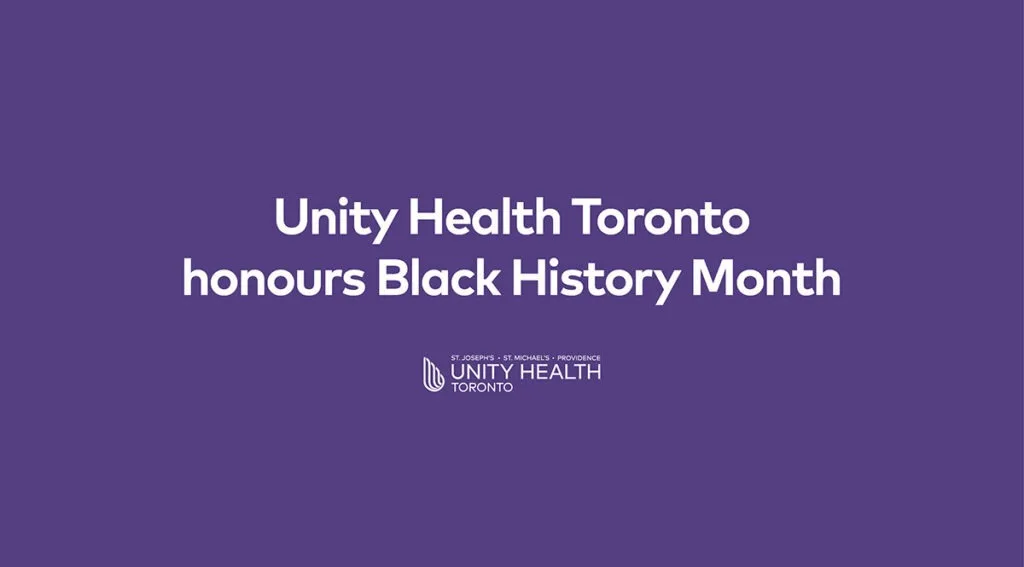
The first Canadian-born Black physician, Dr. Anderson Ruffin Abbott, earned his medical degree at the University of Toronto 160 years ago, yet underrepresentation of Black physicians remains a major issue in our country. It is one of the many reasons that Black people experience disproportionate health outcomes, such as higher rates of mortality and chronic illness.
At the root of these health inequities is anti-Black racism, which, beyond health care, is an ongoing stressor for Black people. It is deeply entrenched in Canadian institutions, including our health care systems, and serves as a barrier and deterrent to health, community and social services.
At Unity Health, we know that there is much more work to do to address anti-Black racism in health care. In the 3.5 years since we established anti-racism as a formal strategic priority, we have focused our efforts on foundational education, data collection and initial targeted strategies towards anti-Black racism. It is now time that we increase our focus on efforts addressing the significant health disparities experienced within Black communities.
Today, as we mark the start of Black History Month, I’d like to provide an update on our efforts to combat anti-Black racism this past year and let you know what we plan to accomplish in the year ahead. Please also join me this month in celebrating the accomplishments and resilience of Black communities, amplifying Black voices and furthering action in your own life towards ending anti-Black racism.
What we accomplished in 2023
Staff-focused efforts:
- We introduced anti-Black racism training for all staff, physicians and learners.
- We offered the first of four healing circles for Black staff, physicians, learners and volunteers.
- We implemented eight mandatory equitable hiring standards for leadership recruitment, including strategies shown to reduce anti-Black racism bias in hiring.
- We offered interactive leadership sessions on how to talk to teams about anti-Black racism in the workplace, and completed a series of talks with Black Health Education Collaborative to support leaders with their accountabilities to address anti-Black racism in health care.
Patient-focused efforts:
- The Family Health Team at St. Michael’s enrolled nearly 100 Black and Indigenous patients through the NEWR Program, which provides a pathway for patients to access primary care.
- The Li Ka Shing Knowledge Institute, in partnership with the hospital’s MAP Centre for Urban Health Solutions, continued their speaker series on ending “race correction” in health care.
- Allison Needham, Director of Anti-Racism, Equity and Social Accountability at Unity Health, joined Ontario Health’s Black Health Plan table, established to help implement the Black Health Plan – a strategy to address long-standing systemic health inequities.
Where we came up short
Last year, Unity Health committed to formalizing an anti-racism policy and framework that establishes an approach to identifying, addressing and eliminating mistreatment on the basis of race. The policy has not yet been formalized, but we took steps to embed anti-Black racism within our Workplace Violence and Harassment Committee. We also laid the foundation for the policy and framework, which will be delivered in partnership with the Office of Indigenous Wellness, Reconciliation and Partnerships.
Concrete actions Unity Health will take in 2024:
- Review accountabilities to ensure that executive leaders address anti-Black racism with direct reports and within their portfolios.
- Establish a provider preference request policy that supports clinical teams when responding to patients’ requests for providers based on race and other human rights grounds.
- Analyze and review care experience data to understand and improve the experiences of Black patients.
- Partner with data registries to better understand and address Black perinatal health outcomes at Unity Health and across the province.
- Launch the LIFT (Leading Inclusive Futures Together) Summer Youth Mentorship program, which aims to inspire and support Black, Indigenous and racialized high school students to pursue careers in medicine.
Unity Health will also continue to hold the organization accountable to addressing anti-Black racism through internal reporting semi-annually.
Concrete actions for individuals
Here are some ways that you can you honour the achievements of Black communities and expand your understanding of anti-Black racism in Canada:
- Read about the experiences of Black staff and physicians at Unity Health in stories on our website and social media channels.
- Attend a Black History Month event in the community. If you’re in Toronto, please consider:
- Read the Ontario Health Black Health Plan to learn how Ontario is responding to systemic health inequities.
- Read this article on the collection of race-based data during the health card renewal process.
I would like to thank everyone at Unity Health who has joined me in making this work a priority over the last 3.5 years. I’m proud of the foundational work we have accomplished, but recognize that we still have a long way to go to addressing the health disparities between Black people and others who live here, and building a truly equitable, anti-racist workplace and patient care experience. I look forward to continuing our efforts this year.
Wishing everyone a reflective and meaningful Black History Month.
Sincerely,
Tim Rutledge
President and CEO
Unity Health Toronto


